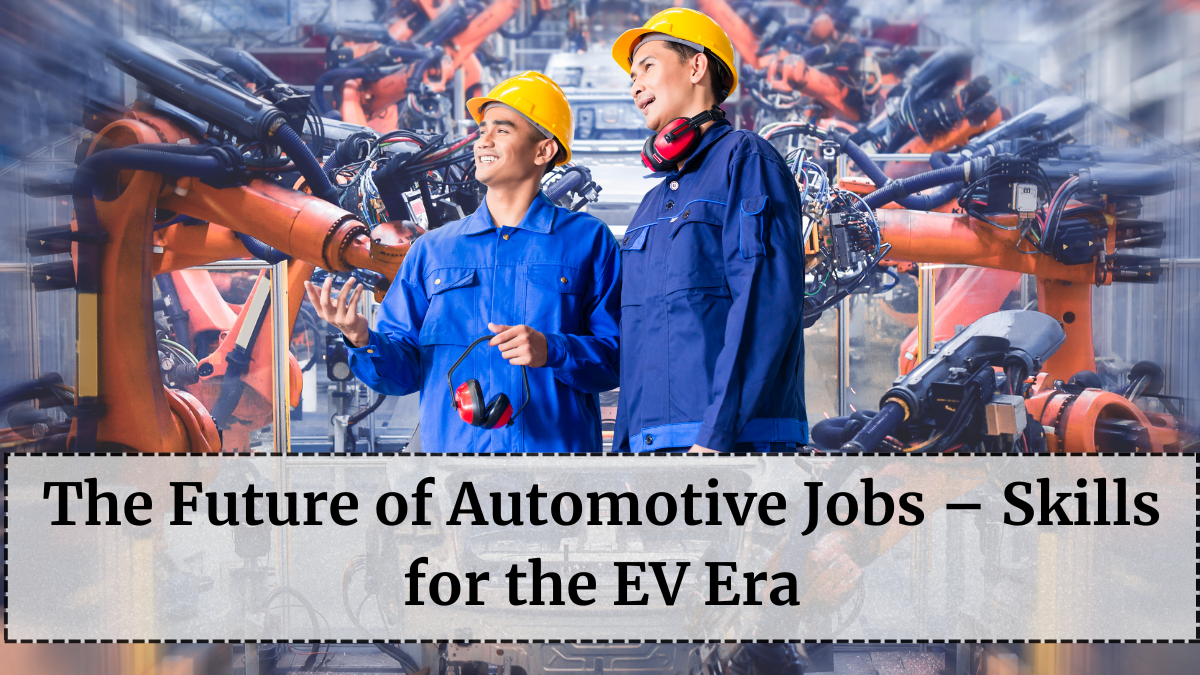The global automotive industry is undergoing its biggest transformation in over a century. By 2025, electric vehicles, AI automation, and digital manufacturing are redefining how cars are designed, built, and maintained. As a result, automotive jobs of the future will require new skill sets — from battery technology and software development to data analytics and sustainability engineering.
India, one of the fastest-growing automotive markets, is now at the center of this shift. With EV adoption rising, factories becoming smarter, and vehicles turning into rolling computers, professionals must adapt to the EV era of employment — one where innovation, intelligence, and technology rule.

The Changing Landscape of Automotive Jobs
From Mechanics to Mechatronics
Traditional mechanics who once specialized in engines and transmissions are now evolving into mechatronics engineers, skilled in both electronics and mechanical systems. Vehicles today combine hardware, software, and connectivity — requiring hybrid expertise across disciplines.
Rise of EV and Battery Manufacturing Jobs
India’s push for electrification through FAME-II and PLI schemes has created thousands of jobs in battery pack design, cell assembly, recycling, and charging infrastructure. Major companies like Tata Motors, Ola Electric, and Mahindra Electric are setting up gigafactories, directly generating opportunities in energy management and EV production.
Digital Transformation of Automotive Work
Factories are now powered by Industry 4.0 technologies — IoT sensors, AI robotics, and cloud analytics. This means roles in robotics maintenance, predictive quality analysis, and software monitoring are now integral to automotive careers.
Emerging Job Roles in the EV and Smart Mobility Sector
1. Battery Engineers and Chemists
These professionals develop lithium-ion, sodium-ion, and solid-state battery systems, focusing on improving range, charging speed, and safety.
Skills needed:
-
Electrochemistry
-
Battery thermal management
-
Energy density optimization
-
Recycling and second-life battery applications
2. EV Design Engineers
Responsible for vehicle architecture, aerodynamics, lightweight materials, and battery placement in electric cars. Design engineers also integrate AI-driven features like driver assistance and smart dashboards.
Skills needed:
-
CAD and simulation tools (CATIA, SolidWorks, Ansys)
-
EV architecture and chassis design
-
Material engineering and crash analysis
3. Software Developers and AI Specialists
As cars become software-defined, demand for embedded systems, AI algorithms, and connected vehicle software is surging. Engineers work on ADAS (Advanced Driver Assistance Systems), infotainment, and real-time telematics.
Skills needed:
-
C++, Python, and MATLAB
-
Machine learning and computer vision
-
Cloud APIs and data communication protocols
4. Charging Infrastructure and Energy Managers
These experts design, install, and manage the EV charging ecosystem, ensuring power stability and grid integration.
Skills needed:
-
Power electronics
-
Smart grid systems
-
Renewable energy integration
-
IoT-based charger management
5. Automotive Data Analysts
Data has become the new fuel for mobility. Analysts interpret vehicle telemetry, predictive maintenance alerts, and driver behavior patterns to improve performance and safety.
Skills needed:
-
SQL, Python, Power BI
-
Data modeling and predictive analytics
-
Real-time sensor data interpretation
6. Autonomous Vehicle Testers and Safety Engineers
Startups like Minus Zero and major brands like Tesla and Volvo are investing in autonomous systems. Testing engineers now validate algorithms that control acceleration, braking, and navigation.
Skills needed:
-
Simulation platforms (CARLA, PreScan)
-
Sensor fusion (LiDAR, radar, camera systems)
-
Ethical AI and safety compliance standards
New Skills Defining Automotive Careers in 2025
1. Cross-Disciplinary Knowledge
Employers now prefer candidates who understand both hardware and software, especially in hybrid roles like automotive electronics or embedded systems engineering.
2. Green Mobility and Sustainability
Awareness of environmental impact, circular economy models, and carbon footprint tracking is becoming essential for product managers and supply chain experts.
3. Digital Literacy and Automation Tools
From robotic programming to digital twins, professionals must be fluent in automation, AR/VR simulations, and cloud-based monitoring systems.
4. Cybersecurity Awareness
As vehicles become connected to the internet, protecting car software from hacking is a top priority. Cybersecurity specialists are now core members of automotive R&D teams.
5. Soft Skills and Adaptability
Team collaboration, design thinking, and problem-solving will matter as much as technical ability. The industry’s rapid evolution favors flexible professionals who learn continuously.
How India’s Automotive Workforce Is Transforming
Government and Industry Collaboration
The Indian government’s Skill India Mission and Automotive Skills Development Council (ASDC) have launched training programs in EV maintenance, battery design, and connected vehicle systems.
Upskilling Initiatives by Manufacturers
Companies like Maruti Suzuki, Hyundai, and Mahindra have established dedicated training centers for engineers transitioning from ICE to EV technologies.
Growth of EV Startups and Tier-II Opportunities
Cities like Pune, Coimbatore, and Bengaluru are becoming hubs for EV component startups, battery recyclers, and AI automotive labs, offering fresh career avenues for young engineers.
Challenges Ahead for Job Seekers
-
Skill Gaps: Many traditional engineers lack exposure to AI or energy systems.
-
Automation Threats: Routine assembly jobs are being replaced by smart robotics.
-
Certification Needs: Specialized training or certification in EV tech is now a hiring requirement for most OEMs.
-
Global Competition: Multinational companies seek highly skilled talent familiar with international standards like ISO 26262 or UNECE regulations.
The Road Ahead for Automotive Professionals
By 2030, nearly 40% of automotive jobs will involve EVs, AI, or automation, according to McKinsey. While mechanical expertise remains valuable, the real demand lies in software integration, energy management, and sustainable design.
India’s automotive professionals stand at a turning point. Those who adapt now — learning new tools, coding languages, and sustainable engineering practices — will lead the global mobility revolution.
The future of automotive jobs is not about replacing humans with machines; it’s about empowering humans to build smarter machines.
FAQs
What are the most in-demand automotive jobs in 2025?
Battery engineers, EV design specialists, data analysts, and software developers are the most in-demand roles in the modern auto industry.
Is coding required in automotive jobs now?
Yes. Coding in C++, Python, and MATLAB is crucial for roles in software-defined vehicles, AI systems, and automation controls.
How can I transition from mechanical engineering to EV jobs?
Upskill with certifications in EV technology, power electronics, or data analytics through programs offered by ASDC or IITs.
Will automation reduce automotive job opportunities?
While automation replaces repetitive tasks, it creates new roles in robotics maintenance, AI supervision, and smart factory operations.
What’s the best skill to learn for future automotive careers?
Focus on EV systems, AI-powered diagnostics, and data-driven decision-making, as they form the backbone of next-generation mobility.
Click here to know more.
